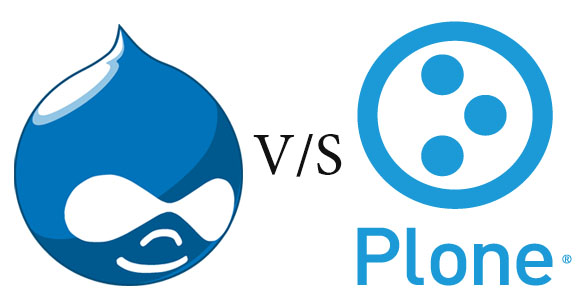Plone Vs Drupal: Which CMS reigns the highest?
A web presence is imperative for the success of every business organization, but creating a great website is quite a daunting task. An open source content management system can help you to create a powerful website in a very limited time and budget. While WordPress and Joomla are the perfect choices for creating smaller websites, when it comes to building a complex corporate website with advanced functionality, you need a robust and highly powerful open source CMS like Drupal or Plone.
Plone and Drupal are both powerful content management systems that are especially designed for highly complex sites. Both these platforms are extremely feature-rich and allow even the non-technical users to upload content on the web with great ease. With such similar goals, it is extremely difficult to make a choice between the two, particularly when you are starting from scratch. You need to assess the content requirements for your web presence and then pick the right tool for the job. By making a comparison between Plone and Drupal, we will show you how these tools meet two different sets of requirements.
Plone is an enterprise quality CMS with high system administration overhead that supports a huge degree of flexibility and control. Drupal is an efficient lightweight CMS that delivers great functionality with relatively lower administrative costs and a breadth of plug-in modules.
Plone Vs Drupal – Feature Comparison
Installation
Drupal is relatively easy to install as it has fewer options about user roles and permissions, request volume trade-offs, workflow, cross-site integration and authentication methods. Plone on the other hand, is a more robust application where it is easy to install the base system but it has an extensive configurability for workflow, fine-grained security, scalability and content transformation that needs proper attention while installation. However, after installation it does not require any additional maintenance overhead.
Customization:
The extensive use of PHP and the practice of combining logic and display code in its coding make minor customizations relatively easy in Drupal. Whereas the widespread use of high quality coding practices such as the general-purpose python language, a refined API, decoupling, modeling and code generation tools allow Plone to support major customizations.
Security:
Both the publishing platforms have a good security record and strip the nasty tags from HTML. In Drupal, the problem arises in the add-on modules. Plone, however, is immune to common attacks because of the design and the way its robust application server works. Relative to Drupal, access control is more granular in Plone. Therefore, Plone is an ideal choice for college and departmental websites where data security is very important.
Scalability:
Plone can handle very high volumes of page requests because of its inherent ability to make use of server clusters and ZEO object oriented database. Moreover, the robust application of Plone allows scaling with clusters, caching and load balancing.
User Interface:
There are a number of differences in the user interfaces of Plone and Drupal. Drupal has a single administrative menu on the left side of the site while Plone has plenty of administrative sections like the site-setup, port let management, edit bar and much more. You can straight away reach wherever you intend to go in Plone because of the separation of different types of functionalities while in Drupal you may require many clicks due to the single admin menu.
Content Items Structure:
In Drupal, every item is a separate element and you can structure the hierarchy of the site by specifying the parent item for every individual item separately. This makes changing the item location easier. Plone on the other hand, differentiates content types into folderish and non-folderish. Therefore, if you want to create a new element, you have to create it within the item that contains it. Plone is certainly a better choice for hierarchical content.
Hosting Requirements:
Plone requires highly sophisticated hosting services whereas Drupal does not require any dedicated web server to set up a website. Many inexpensive and shared hosting with limited memory and processing speed can meet Drupal’s minimum system requirements. If you do not want to spend a lot of money and if your website is for a very small company or personal use, it is advisable to use Drupal.
Community:
Both the publishing platforms have an enthusiastic community. Drupal has a large community with a very high forum topic volume and a vast amount of contributed content. Drupal does a good job in assisting beginners through its handbook. Plone has a small community of helpful and accessible developers and a dedicated documentation project.
Contributed Add-ons:
Drupal has thousands of contributed modules that greatly enhance Drupal’s basic functionality, offer plenty of useful features and integrate it with other systems. Relative to Drupal, Plone has hundreds of add-ons to improve its functionality.
Plone is a more enterprise oriented Content Management System with advanced features and complex functionality. Drupal is a better web content management system that does not have advanced features and workflow.



